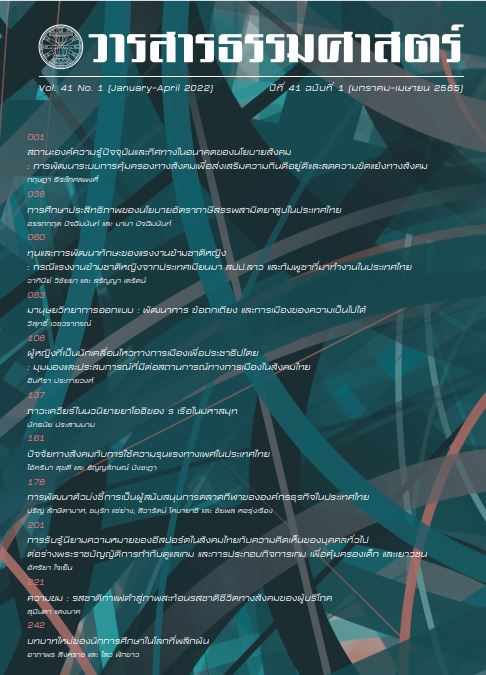New Roles for Educators in Disruption World
Main Article Content
Abstract
Nowadays, new technologies have played an important role in changing the world which may be called “disruptive technologies”. They affect the lives of all people, making the world in a state of volatility, uncertainty, complexity, and ambiguity. The
objective of this article is to present perspective on the new role of educators to the changing world in three key areas: 1) Self-improvement to be aware of the changing world, 2) Development of the ability to manage learning and 3) Assessing learning outcomes of learners. The goal is to transform the concept of traditional learning management into a learning management that aims to improve the learners' ability to live in a dynamic world. The recommendations for Thai educators are as follows: 1) Developing themselves to be knowledgeable in various fields, knowledge and essential skills in the future for learners, 2) Transition instruction from teacher-centered and content based learning to learning management focused on developing learner competencies and 3) Applying holistic measurements and assessments that encompass knowledge, Skills/competencies and desirable characteristics of the learners by using authentic measurement and assessment.
Article Details
References
งานบริหารทรัพยากรสุขภาพ คณะแพทยศาสตร์ศิริราชพยาบาล มหาวิทยาลัยมหิดล. (2563). การกำหนดเป้าหมายด้วย SMART goals. สืบค้น 10 พฤศจิกายน 2563, จาก https://www.si.mahidol.ac.th/th/division/um/knowledge_detail.asp?id=179
สำนักงานเลขาธิการสภาการศึกษา. (2560). แผนการศึกษาแห่งชาติ พ.ศ. 2560-2579. บริษัทพริกหวานกราฟฟิคจำกัด: กรุงเทพฯ.
________. (2562). ครูไทยยุคใหม่สนใจดิจิทัล. บริษัทพริกหวาน จำกัด: กรุงเทพฯ.
สำนักงานเลขานุการของคณะกรรมการยุทธศาสตร์ชาติ. (2561). ยุทธศาสตร์ชาติ พ.ศ. 2561-2580. สำนักงานคณะกรรมการพัฒนาการเศรษฐกิจและสังคมแห่งชาติ: กรุงเทพฯ.
สลิลนา ศรีสุขศิริพันธ์. (2555, มิถุนายน 24). ศาสตร์ คืออะไร. [ออนไลน์]. สืบค้น 8 พฤศจิกายน 2563, จาก https://www.gotoknow.org/ posts/461639
ไสว ฟักขาว. (2562). การจัดการเรียนรู้เพื่อส่งเสริมทักษะในศตวรรษที่ 21. มหาวิทยาลัยราชภัฏจันทรเกษม: กรุงเทพฯ.
สมเสมอ ทักษิณ และภิญโญ วงษ์ทอง. (2563). การแก้ปัญหาอย่างสร้างสรรค์ (creative problem solving). นครนายก: สถาบันวิจัยพัฒนาและสาธิตการศึกษา มหาวิทยาลัยศรีนครินทรวิโรฒ.
Baker, E.L., O’Neill, H. F.,Jr., & Linn, R. L..(1993). Policy and validity prospects for performance based assessment. American Psychologist, 48, 1210-1218.
Greenstein, L. (2012). Assessing 21st Century Skills: A Guide to Evaluating Mastery and Authentic Learning. Corwin: California, USA.
Schaaf, R. L., Jukes, I. (2019). A Brief History of the Future of Education: Learning in the Age of Disruption. (SAGE Publications Asia-Pacific Pte. Ltd). [Kindle version 5]. Retrieved 4 October, 2020, from http://www.amazon.com

